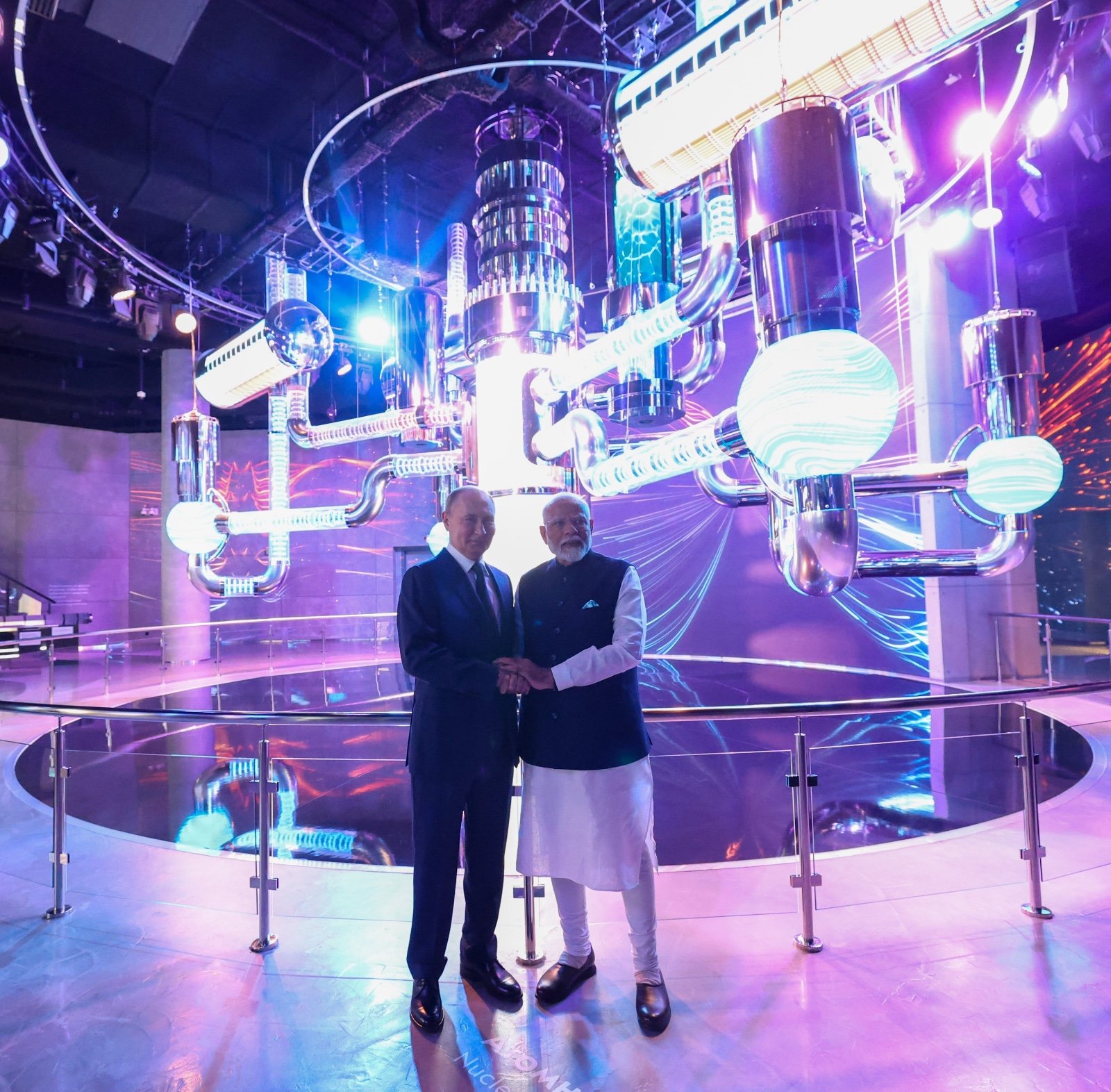Why India and Russia Are Turning to Civilisational Memory in an Age of Strategic Amnesia
Within the span of a few hours, two of the world’s most prominent political leaders--India’s Narendra Modi and Russia’s Vladimir Putin--delivered sweeping addresses that had little to do with infrastructure or military posturing.
Instead, they spoke about manuscripts, music, ancient texts, and cultural heritage. But these were not mere nostalgic speeches. They were clear signals that both nations are moving decisively to convert their cultural capital into instruments of strategic autonomy, digital sovereignty, and geopolitical resistance.
 |
| Indian PM Modi with Russian Prez Putin. File Photo via PM NaMo |
He described centuries of manuscript loss and foreign appropriation, called attention to the “piracy” of Indian medical, agricultural and spiritual texts, and warned that what remains must now be safeguarded with technological force. “This is about preserving our roots,” he said, “but also about protecting the future.”
In St. Petersburg, at the XI United Cultures Forum, Vladimir Putin gave a far longer and in many ways more loaded address. He described culture as the only remaining unifying force in a fractured global order, and openly framed cultural preservation as a form of resistance--against what he called the “dogmatic belief in superiority” of Western societies and their “erasure” of national identities.
In Putin’s telling, it is not just tanks or trade routes under siege--it is memory itself. And culture, particularly literary and artistic heritage, must now be redeployed to “counteract neo-Nazism, Russophobia, and historical falsification.”
Russia’s DIVERSITY is its secret to power — Putin at United Cultures Forum
— Bernadette 🏴🇮🇪🇷🇺🇵🇸 (@BDooher) September 12, 2025
Multiethnic society KEY to its strength
It’s ‘something that ONLY exists here in Russia’. pic.twitter.com/M6irAt3K4u
Despite divergent political systems and diplomatic alignments, the overlap is unmistakable. India is digitising manuscripts to assert civilisational authorship and prevent foreign expropriation. Russia is archiving cultural memory to reassert narrative sovereignty amid information war.
Both are building cultural infrastructure--India through public portals and AI translation, Russia through state-run documentary studios in Donbas and new cultural centers across Crimea and the Caucasus. Both see cultural preservation as a shield against global fragmentation.
भारत की प्राचीन पांडुलिपियां हमारी गौरवशाली विरासत का जीवंत प्रतीक हैं। इन्हें डिजिटल रूप में संरक्षित करने की ऐतिहासिक पहल से हमारी समृद्ध संस्कृति को वैश्विक मंच पर एक नई पहचान मिलने वाली है। pic.twitter.com/iAgIewhq3t
— Narendra Modi (@narendramodi) September 12, 2025
For India, the digitisation push is also about preempting the legal vacuum in global IP regimes. For decades, ancient Indian medical and botanical knowledge has been patented overseas, often without attribution or consent.
Modi’s speech linked the project to the global creative economy--valued at $2.5 trillion--and insisted that digitised manuscripts would serve as “data banks” for research, innovation, and international legal defence. He urged Indian youth to use AI to study ancient texts, not as museum pieces, but as raw material for the future.
Putin, for his part, drew a straight line between cultural memory and national resilience. His government is now restoring regional theaters, funding historically themed cinema, and launching “Intervision,” a Soviet-era music contest designed to rival Eurovision.
His Culture Minister, Olga Lyubimova, detailed how Russia is opening cinemas and studios in contested regions like Lugansk and Kherson, building what she called “film chronicle bases” for wartime memory. The message is clear: historical narrative is not a neutral domain, and if Russia does not write its own story, someone else will.
Addressing the International Conference on #GyanBharatam in Delhi. The initiative focuses on preserving, digitising and popularising India's manuscript heritage. https://t.co/NOoPBkEZRg
— Narendra Modi (@narendramodi) September 12, 2025
There are differences in approach. India’s Gyan Bharatam is built on open digitisation, multilateral cooperation, and public access, drawing support from countries like Mongolia, Vietnam, and Thailand.
Russia’s model is more state-curated and tightly controlled, often tied to specific ideological goals. But the underlying rationale is shared: culture is not just a marker of identity, it is now an operational layer of sovereignty.
Both projects come at a time when global institutions are losing authority over facts, memory, and legitimacy. The arbitral tribunal that ruled in India’s favor in the South China Sea was ignored.
Russia’s cultural diplomacy is largely dismissed in Europe and North America. Western museums remain locked in legal battles over colonial-era artifacts. In this vacuum, states are turning inward--not to isolate, but to build their own parallel legitimacy. In this emerging order, manuscripts and monuments may matter more than votes at the UN.
Full speech of President Putin at the St. Petersburg Forum of United Cultures. pic.twitter.com/wIOaVfqGqr
— Alex Santic (@TopofMurrayHill) September 12, 2025
What Modi and Putin are attempting is narrative rearmament. They are telling their populations, and the world, that memory is strategic. That heritage is not a soft asset but a hard claim. And that in a digital century where stories move faster than facts, civilisational authorship must be enforced by code, archive, and state power.
ALSO READ:
Russia Accuses Estonia of Cultural Erasure After Transfer of Russian Center in Tallinn
Putin Calls for Cultural Resistance to ‘Western Bias’ and ‘Memory Wars’ at United Cultures Forum
